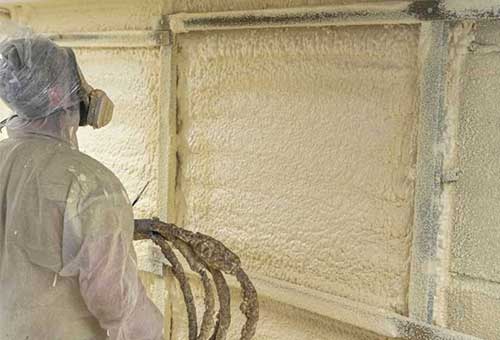When you’re investing in home insulation, you want a solution that lasts, ideally, as long as your home itself. Replacing insulation every decade isn’t just inconvenient – it’s costly and time-consuming. That’s why more Tennessee homeowners and builders are turning to spray foam insulation. Thanks to its long-term performance that can span numerous decades, spray foam is built for many years of comfort, especially in our varying Tennessee climate.
Built to Last: Spray Foam’s Long-Term Performance
So, how long does spray foam last? Closed cell spray foam, when installed correctly, can last the lifetime of your home, from 80 years to 100 years, while open cell spray foam performs well for 30 years or more in real world conditions. A single installation process can provide value for generations for you and future homeowners.
Spray foam doesn’t sag, settle, or compress which adds to its durability. It holds its R-value (insulating power) over time while staying in place which means your home will stay just as energy-efficient in year 20 as it did on day one.
Thanks to its long-term reliability, spray foam is often seen as a permanent solution. Once installed correctly, it doesn’t need to be replaced, making it a “set it and forget it” option, giving peace of mind to homeowners and confidence to builders and contractors.

Durable and Low Maintenance Performance
One of the most appealing aspects of installing spray foam is how little attention it needs afterward. Once spray foam is correctly installed and cured, there’s no need to worry about settling, moisture retention, moldy patches, or pest problems.
Its durability means it won’t crumble, shrink or shift when applied under proper conditions. Because it both insulates and air seals, years later, spray foam keeps its airtight seal without needing “top offs” or replacements. That’s a major factor that affects the lifespan of spray foam insulation. And it means you’ll only need occasional professional inspections decades after installation.
Resistant to Moisture and Mold: Built for Humid Climates Like Tennessee
Our Tennessee summers are brutal, and humidity is a very real challenge throughout our state. That’s why here in Tennessee, moisture resistance matters. Thankfully, closed cell spray foam acts as both an air and moisture barrier. It doesn’t absorb water like other insulation material types, and even after a heavy rain or minor flooding, it doesn’t get waterlogged and continues performing. Plus, its inorganic makeup means mold doesn’t like to grow on it. Spray foam also blocks warm, damp air from creating condensation in cooler areas which contributes to better indoor air quality over time. This keeps your home healthier and undamaged through decades of humid summers and damp winters.
Keeps Pests Out for the Long Haul
Spray foam is a convenient “Keep Out” sign for unwanted bugs and critters. It doesn’t provide food or nesting material for pests, including termites and rodents. Plus, it seals cracks and penetrations that bugs and rodents use to get in, reducing the chance of an infestation in your home, crawl space or attic. Even in termite-prone Tennessee, spray foam stays intact, keeping pests away. It’s important to note for builders and contractors, they should follow building code guidelines for termite inspections by leaving termite inspection strips in certain areas to stay compliant.
Reinforces Your Home’s Structural Strength
Not all insulation just insulates. Closed cell spray foam also adds structural strength to your home. Once it cures, it hardens into a dense material that supports your walls, roofs, and floors by adhering strongly to the different surfaces and bonding building materials. This extra rigidity helps your home stand up to extreme weather, especially in parts of Tennessee that see high winds and storms. This structural reinforcement continues over the lifetime of your spray foam, helping your home feel more solid over the decades, with fewer squeaks and wall vibrations.
Tailored for Tennessee’s Climate
With Tennessee’s wide range of seasonal temperatures and humidity swings, our homes need adaptable insulation. Spray foam handles it all. It’s formulated to hold up under our intense Tennessee heat and moisture, doesn’t melt or deteriorate in high attic temps, and keeps its airtight seal through our freezing winters and scorching summers. In addition to sealing and insulating, it helps regulate humidity in unvented attics, reducing the strain on your HVAC system. It provides energy efficiency, comfort, and consistent performance throughout every season.
Practical Tips for Long-Term Success
Choosing between types of spray foam insulation is key. Use closed cell spray foam in your basement or crawl space for moisture resistance and strength. Go with open cell spray foam for your interior walls where soundproofing is a bonus. No matter the type, proper installation is essential. If installation is done wrong, even the best foam can lose its effectiveness before its time. Work with an insulation professional like B&M Insulation who understands how environmental conditions and insulation costs affect your specific home.
Although little maintenance is needed for spray foam, it’s good practice to check for signs of leaks or damage after a severe storm.
And focus maintenance on house systems rather than the foam itself. Your spray foam will last a long time and won’t suddenly lose its R-value, so if your energy bill increases after a long time, it’s probably due to your HVAC unit, not your insulation.
Final Thoughts
The bottom line for both local Tennessee homeowners and builders is that spray foam insulation offers more than comfort, it delivers long insulation and air sealing performance that lasts decades. With its resistance to moisture, pests, and structural wear, it’s a smart choice for your Tennessee home or building project. When considering insulation, think long-term.
Start by trusting the experts at B&M Insulation for the best tailored insulation solutions in Murfreesboro and beyond and make sure your insulation material gives you lasting peace of mind.
Works Cited
AccuFoam. (n.d.). Spray Foam Structural Strength. Retrieved from https://accufoam.com/spray-foam-structural-strength.
Armored Insulation. (n.d.). How long does spray foam insulation last in Reidland’s climate? Retrieved from https://armored-insulation.com/how-long-does-spray-foam-insulation-last-in-reidlands-climate/
DeVere Insulation. (n.d.). Why spray foam insulation is a smart choice for Maryland homes. Retrieved from https://devereinsulation.com/why-spray-foam/
National Association of Home Builders. (2017). Spray foam insulation & termites report. Retrieved from https://www.nahb.org/-/media/NAHB/advocacy/docs/legal-issues/construction-liability/builder-resources/spf-termite-report-2017.pdf
Vega Bond. (June 21, 2024). Does spray foam stop water? Explore the waterproofing power. Retrieved from https://vbinsulation.com/blogs/insulation-insider-latest-trends-and-techniques/does-spray-foam-stop-water-explore-now?srsltid=AfmBOoru94ifF61o-jC2eMo2p9tXSPgzEpzeo92sh1ZXpjheBIRrbwDR
